Entrepreneurship and Small Business Management
VerifiedAdded on 2024/04/26
|17
|4362
|288
AI Summary
This project explores the various aspects of entrepreneurship, including different types of ventures, their impact on the economy, key entrepreneurial mind-set aspects, and environments fostering or hindering entrepreneurship. It emphasizes the importance of small businesses in driving economic growth.
Contribute Materials
Your contribution can guide someone’s learning journey. Share your
documents today.

Entrepreneurship and Small
Business Management
1
Business Management
1
Secure Best Marks with AI Grader
Need help grading? Try our AI Grader for instant feedback on your assignments.
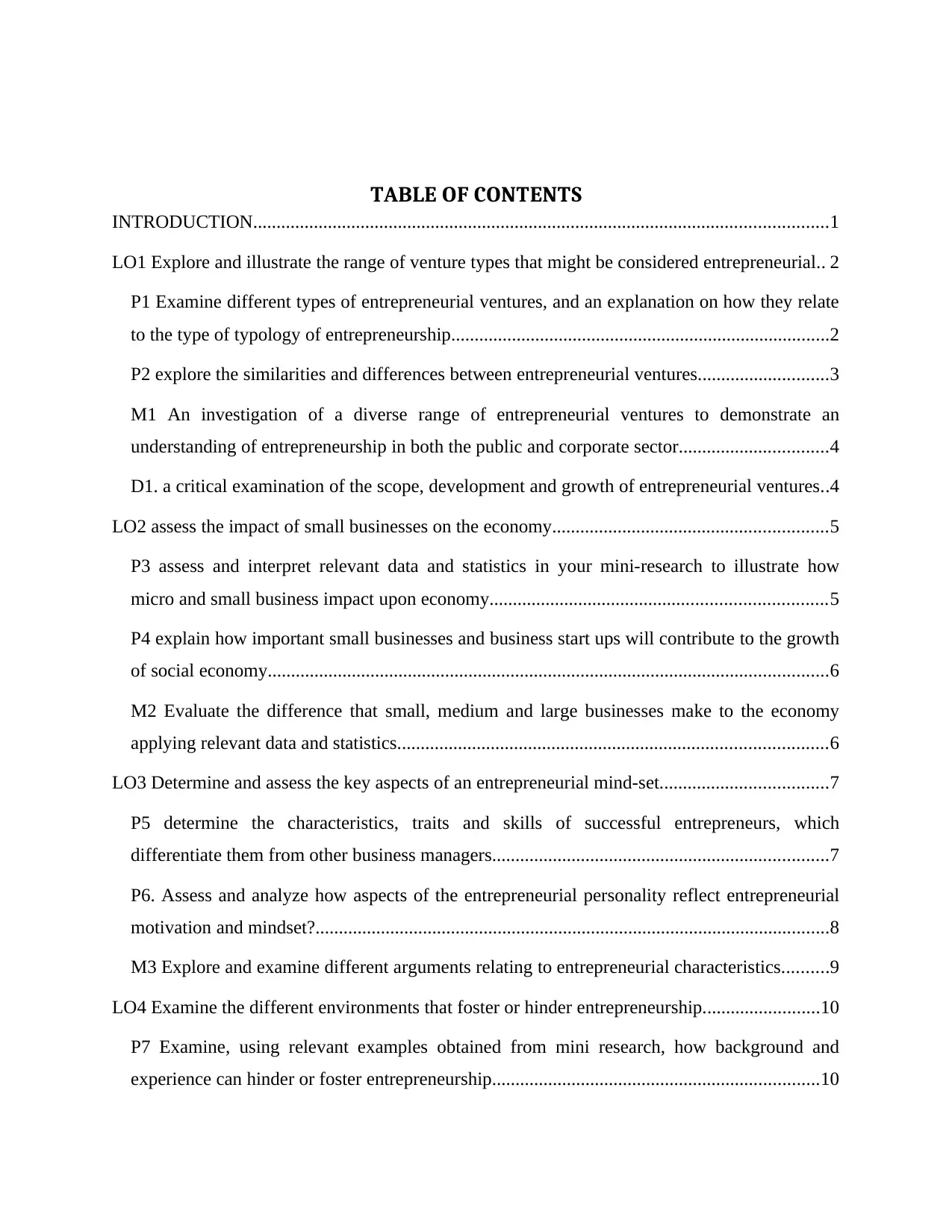
TABLE OF CONTENTS
INTRODUCTION...........................................................................................................................1
LO1 Explore and illustrate the range of venture types that might be considered entrepreneurial.. 2
P1 Examine different types of entrepreneurial ventures, and an explanation on how they relate
to the type of typology of entrepreneurship.................................................................................2
P2 explore the similarities and differences between entrepreneurial ventures............................3
M1 An investigation of a diverse range of entrepreneurial ventures to demonstrate an
understanding of entrepreneurship in both the public and corporate sector................................4
D1. a critical examination of the scope, development and growth of entrepreneurial ventures..4
LO2 assess the impact of small businesses on the economy...........................................................5
P3 assess and interpret relevant data and statistics in your mini-research to illustrate how
micro and small business impact upon economy........................................................................5
P4 explain how important small businesses and business start ups will contribute to the growth
of social economy........................................................................................................................6
M2 Evaluate the difference that small, medium and large businesses make to the economy
applying relevant data and statistics............................................................................................6
LO3 Determine and assess the key aspects of an entrepreneurial mind-set....................................7
P5 determine the characteristics, traits and skills of successful entrepreneurs, which
differentiate them from other business managers........................................................................7
P6. Assess and analyze how aspects of the entrepreneurial personality reflect entrepreneurial
motivation and mindset?..............................................................................................................8
M3 Explore and examine different arguments relating to entrepreneurial characteristics..........9
LO4 Examine the different environments that foster or hinder entrepreneurship.........................10
P7 Examine, using relevant examples obtained from mini research, how background and
experience can hinder or foster entrepreneurship......................................................................10
INTRODUCTION...........................................................................................................................1
LO1 Explore and illustrate the range of venture types that might be considered entrepreneurial.. 2
P1 Examine different types of entrepreneurial ventures, and an explanation on how they relate
to the type of typology of entrepreneurship.................................................................................2
P2 explore the similarities and differences between entrepreneurial ventures............................3
M1 An investigation of a diverse range of entrepreneurial ventures to demonstrate an
understanding of entrepreneurship in both the public and corporate sector................................4
D1. a critical examination of the scope, development and growth of entrepreneurial ventures..4
LO2 assess the impact of small businesses on the economy...........................................................5
P3 assess and interpret relevant data and statistics in your mini-research to illustrate how
micro and small business impact upon economy........................................................................5
P4 explain how important small businesses and business start ups will contribute to the growth
of social economy........................................................................................................................6
M2 Evaluate the difference that small, medium and large businesses make to the economy
applying relevant data and statistics............................................................................................6
LO3 Determine and assess the key aspects of an entrepreneurial mind-set....................................7
P5 determine the characteristics, traits and skills of successful entrepreneurs, which
differentiate them from other business managers........................................................................7
P6. Assess and analyze how aspects of the entrepreneurial personality reflect entrepreneurial
motivation and mindset?..............................................................................................................8
M3 Explore and examine different arguments relating to entrepreneurial characteristics..........9
LO4 Examine the different environments that foster or hinder entrepreneurship.........................10
P7 Examine, using relevant examples obtained from mini research, how background and
experience can hinder or foster entrepreneurship......................................................................10

CONCLUSION..............................................................................................................................10
REFERENCES................................................................................................................................1
REFERENCES................................................................................................................................1

LIST OF FIGURES
Figure 1: Entrepreneurial traits........................................................................................................8
Figure 1: Entrepreneurial traits........................................................................................................8
Secure Best Marks with AI Grader
Need help grading? Try our AI Grader for instant feedback on your assignments.
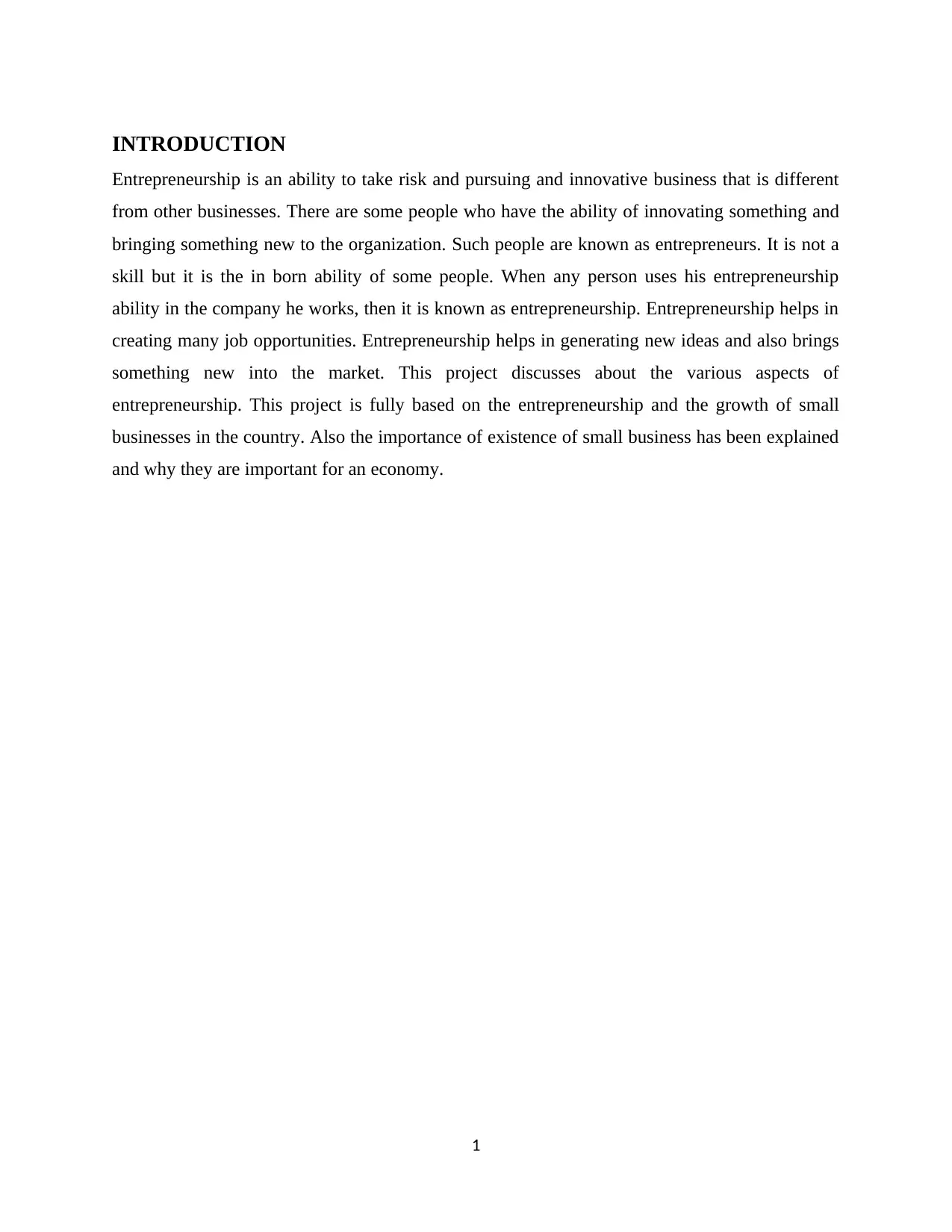
INTRODUCTION
Entrepreneurship is an ability to take risk and pursuing and innovative business that is different
from other businesses. There are some people who have the ability of innovating something and
bringing something new to the organization. Such people are known as entrepreneurs. It is not a
skill but it is the in born ability of some people. When any person uses his entrepreneurship
ability in the company he works, then it is known as entrepreneurship. Entrepreneurship helps in
creating many job opportunities. Entrepreneurship helps in generating new ideas and also brings
something new into the market. This project discusses about the various aspects of
entrepreneurship. This project is fully based on the entrepreneurship and the growth of small
businesses in the country. Also the importance of existence of small business has been explained
and why they are important for an economy.
1
Entrepreneurship is an ability to take risk and pursuing and innovative business that is different
from other businesses. There are some people who have the ability of innovating something and
bringing something new to the organization. Such people are known as entrepreneurs. It is not a
skill but it is the in born ability of some people. When any person uses his entrepreneurship
ability in the company he works, then it is known as entrepreneurship. Entrepreneurship helps in
creating many job opportunities. Entrepreneurship helps in generating new ideas and also brings
something new into the market. This project discusses about the various aspects of
entrepreneurship. This project is fully based on the entrepreneurship and the growth of small
businesses in the country. Also the importance of existence of small business has been explained
and why they are important for an economy.
1
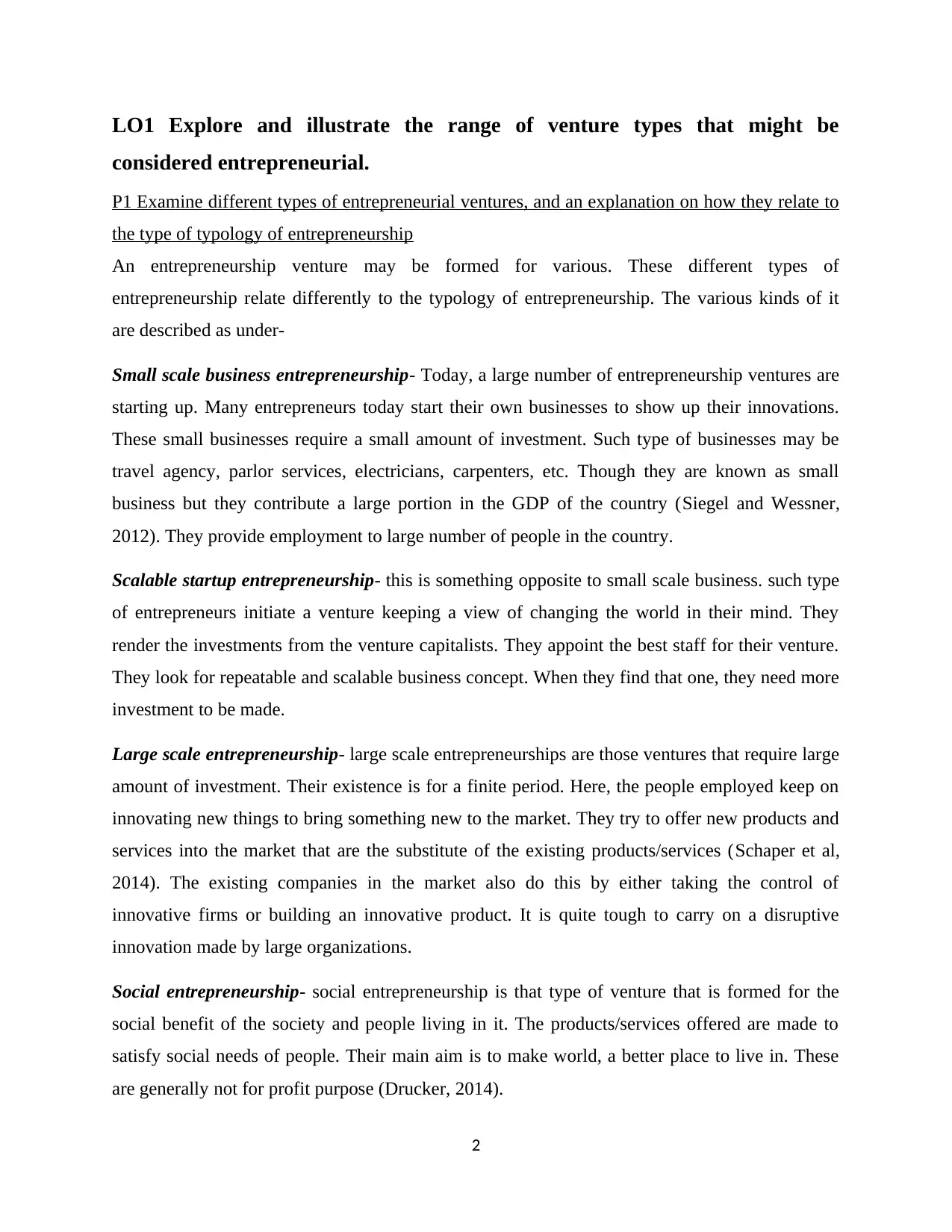
LO1 Explore and illustrate the range of venture types that might be
considered entrepreneurial.
P1 Examine different types of entrepreneurial ventures, and an explanation on how they relate to
the type of typology of entrepreneurship
An entrepreneurship venture may be formed for various. These different types of
entrepreneurship relate differently to the typology of entrepreneurship. The various kinds of it
are described as under-
Small scale business entrepreneurship- Today, a large number of entrepreneurship ventures are
starting up. Many entrepreneurs today start their own businesses to show up their innovations.
These small businesses require a small amount of investment. Such type of businesses may be
travel agency, parlor services, electricians, carpenters, etc. Though they are known as small
business but they contribute a large portion in the GDP of the country (Siegel and Wessner,
2012). They provide employment to large number of people in the country.
Scalable startup entrepreneurship- this is something opposite to small scale business. such type
of entrepreneurs initiate a venture keeping a view of changing the world in their mind. They
render the investments from the venture capitalists. They appoint the best staff for their venture.
They look for repeatable and scalable business concept. When they find that one, they need more
investment to be made.
Large scale entrepreneurship- large scale entrepreneurships are those ventures that require large
amount of investment. Their existence is for a finite period. Here, the people employed keep on
innovating new things to bring something new to the market. They try to offer new products and
services into the market that are the substitute of the existing products/services (Schaper et al,
2014). The existing companies in the market also do this by either taking the control of
innovative firms or building an innovative product. It is quite tough to carry on a disruptive
innovation made by large organizations.
Social entrepreneurship- social entrepreneurship is that type of venture that is formed for the
social benefit of the society and people living in it. The products/services offered are made to
satisfy social needs of people. Their main aim is to make world, a better place to live in. These
are generally not for profit purpose (Drucker, 2014).
2
considered entrepreneurial.
P1 Examine different types of entrepreneurial ventures, and an explanation on how they relate to
the type of typology of entrepreneurship
An entrepreneurship venture may be formed for various. These different types of
entrepreneurship relate differently to the typology of entrepreneurship. The various kinds of it
are described as under-
Small scale business entrepreneurship- Today, a large number of entrepreneurship ventures are
starting up. Many entrepreneurs today start their own businesses to show up their innovations.
These small businesses require a small amount of investment. Such type of businesses may be
travel agency, parlor services, electricians, carpenters, etc. Though they are known as small
business but they contribute a large portion in the GDP of the country (Siegel and Wessner,
2012). They provide employment to large number of people in the country.
Scalable startup entrepreneurship- this is something opposite to small scale business. such type
of entrepreneurs initiate a venture keeping a view of changing the world in their mind. They
render the investments from the venture capitalists. They appoint the best staff for their venture.
They look for repeatable and scalable business concept. When they find that one, they need more
investment to be made.
Large scale entrepreneurship- large scale entrepreneurships are those ventures that require large
amount of investment. Their existence is for a finite period. Here, the people employed keep on
innovating new things to bring something new to the market. They try to offer new products and
services into the market that are the substitute of the existing products/services (Schaper et al,
2014). The existing companies in the market also do this by either taking the control of
innovative firms or building an innovative product. It is quite tough to carry on a disruptive
innovation made by large organizations.
Social entrepreneurship- social entrepreneurship is that type of venture that is formed for the
social benefit of the society and people living in it. The products/services offered are made to
satisfy social needs of people. Their main aim is to make world, a better place to live in. These
are generally not for profit purpose (Drucker, 2014).
2
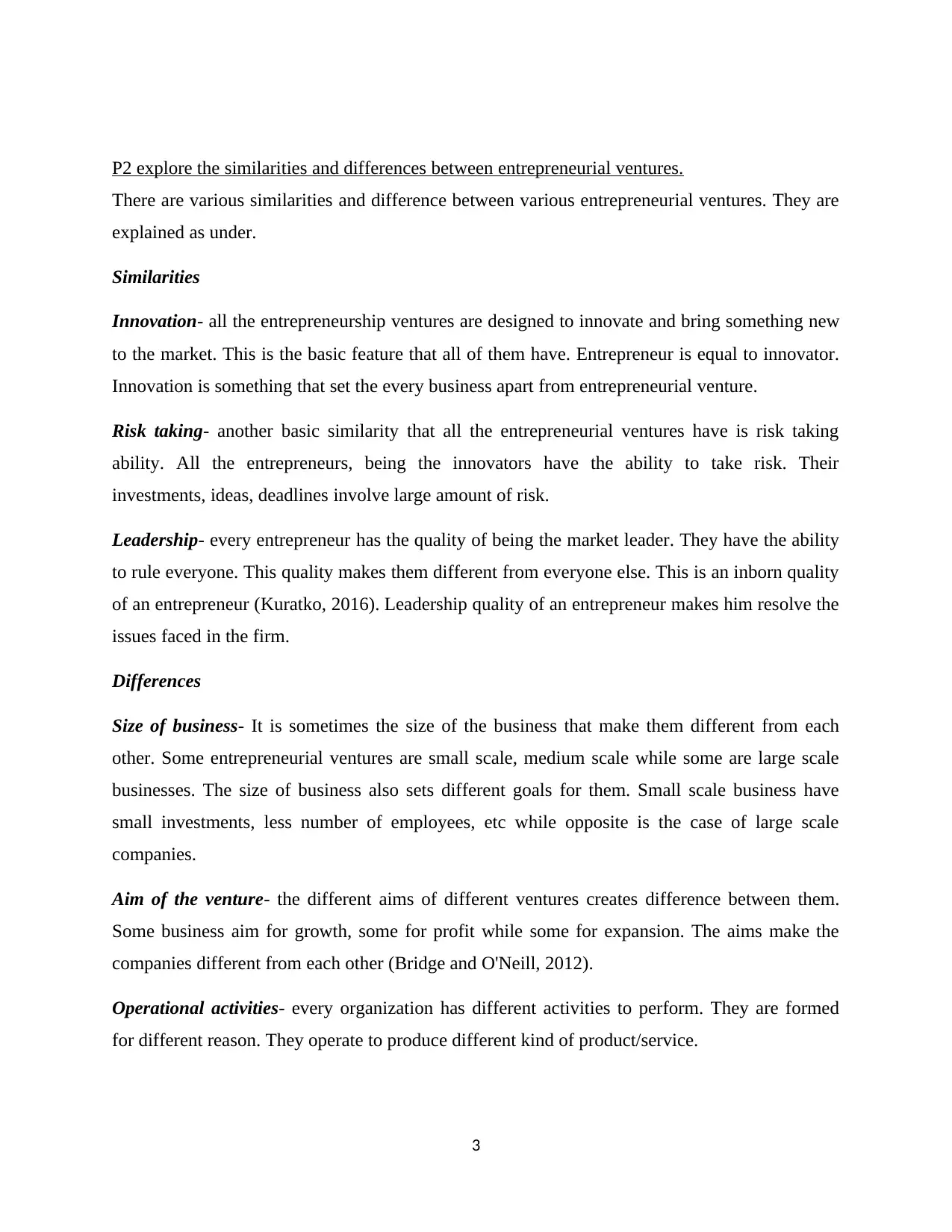
P2 explore the similarities and differences between entrepreneurial ventures.
There are various similarities and difference between various entrepreneurial ventures. They are
explained as under.
Similarities
Innovation- all the entrepreneurship ventures are designed to innovate and bring something new
to the market. This is the basic feature that all of them have. Entrepreneur is equal to innovator.
Innovation is something that set the every business apart from entrepreneurial venture.
Risk taking- another basic similarity that all the entrepreneurial ventures have is risk taking
ability. All the entrepreneurs, being the innovators have the ability to take risk. Their
investments, ideas, deadlines involve large amount of risk.
Leadership- every entrepreneur has the quality of being the market leader. They have the ability
to rule everyone. This quality makes them different from everyone else. This is an inborn quality
of an entrepreneur (Kuratko, 2016). Leadership quality of an entrepreneur makes him resolve the
issues faced in the firm.
Differences
Size of business- It is sometimes the size of the business that make them different from each
other. Some entrepreneurial ventures are small scale, medium scale while some are large scale
businesses. The size of business also sets different goals for them. Small scale business have
small investments, less number of employees, etc while opposite is the case of large scale
companies.
Aim of the venture- the different aims of different ventures creates difference between them.
Some business aim for growth, some for profit while some for expansion. The aims make the
companies different from each other (Bridge and O'Neill, 2012).
Operational activities- every organization has different activities to perform. They are formed
for different reason. They operate to produce different kind of product/service.
3
There are various similarities and difference between various entrepreneurial ventures. They are
explained as under.
Similarities
Innovation- all the entrepreneurship ventures are designed to innovate and bring something new
to the market. This is the basic feature that all of them have. Entrepreneur is equal to innovator.
Innovation is something that set the every business apart from entrepreneurial venture.
Risk taking- another basic similarity that all the entrepreneurial ventures have is risk taking
ability. All the entrepreneurs, being the innovators have the ability to take risk. Their
investments, ideas, deadlines involve large amount of risk.
Leadership- every entrepreneur has the quality of being the market leader. They have the ability
to rule everyone. This quality makes them different from everyone else. This is an inborn quality
of an entrepreneur (Kuratko, 2016). Leadership quality of an entrepreneur makes him resolve the
issues faced in the firm.
Differences
Size of business- It is sometimes the size of the business that make them different from each
other. Some entrepreneurial ventures are small scale, medium scale while some are large scale
businesses. The size of business also sets different goals for them. Small scale business have
small investments, less number of employees, etc while opposite is the case of large scale
companies.
Aim of the venture- the different aims of different ventures creates difference between them.
Some business aim for growth, some for profit while some for expansion. The aims make the
companies different from each other (Bridge and O'Neill, 2012).
Operational activities- every organization has different activities to perform. They are formed
for different reason. They operate to produce different kind of product/service.
3
Paraphrase This Document
Need a fresh take? Get an instant paraphrase of this document with our AI Paraphraser

M1 An investigation of a diverse range of entrepreneurial ventures to demonstrate an
understanding of entrepreneurship in both the public and corporate sector
Below an explanation is given regarding the understanding of role of entrepreneurship in public
as well as private sector.
Corporate sector- corporate sector are operated by public as well as private sector. But in UK
corporate sector is just in private hands. Big corporate companies like Tesco, ITV etc are big
corporate chains that render their goods and services on daily basis. But profit is not only their
motive of working. They also provide jobs to large number of individuals in the country. Such
corporate companies have large impact on the society and economy as well (Drucker, 2014.).
Public sector- entrepreneurial companies are formed to offer either goods or services. In UK
national health services (NHS) is the biggest public sector enterprise. It provides health related
services to the people of UK. It is formed for the purpose of benefit. It provides high rate of
employment. It provides its facilities to whole of UK. In United Kingdom, no steel plants are
operated by government of the country (Bridge and O'Neill, 2012). But in some countries like
Russia, China, Cuba etc mines and oil fields are governed by the government.
D1. a critical examination of the scope, development and growth of entrepreneurial ventures
The entrepreneurial companies are judged on the basis of innovations that they make. They are
judges on the criteria of scope, development and growth. For this the nature of both public and
private sector companies have been judged-
Scope- National health services (NHS) is a public sector venture renders health related services
to the people of UK. It provides free of cost health benefits to the legal citizens of United
Kingdom. NHS provided its free health and medical facilities throughout UK at the time of
Second World War. Many leading businesses of UK have the basic aim of providing the basic
amenities to people and providing them satisfaction (Naudé, 2014). While some have the goal of
serving humanity. Each and every company strives for its goal.
Development- the government of UK also helps some companies in their development. They
also helped NHS by keep on employing doctors, nurses etc for the company. Thus it has been
4
understanding of entrepreneurship in both the public and corporate sector
Below an explanation is given regarding the understanding of role of entrepreneurship in public
as well as private sector.
Corporate sector- corporate sector are operated by public as well as private sector. But in UK
corporate sector is just in private hands. Big corporate companies like Tesco, ITV etc are big
corporate chains that render their goods and services on daily basis. But profit is not only their
motive of working. They also provide jobs to large number of individuals in the country. Such
corporate companies have large impact on the society and economy as well (Drucker, 2014.).
Public sector- entrepreneurial companies are formed to offer either goods or services. In UK
national health services (NHS) is the biggest public sector enterprise. It provides health related
services to the people of UK. It is formed for the purpose of benefit. It provides high rate of
employment. It provides its facilities to whole of UK. In United Kingdom, no steel plants are
operated by government of the country (Bridge and O'Neill, 2012). But in some countries like
Russia, China, Cuba etc mines and oil fields are governed by the government.
D1. a critical examination of the scope, development and growth of entrepreneurial ventures
The entrepreneurial companies are judged on the basis of innovations that they make. They are
judges on the criteria of scope, development and growth. For this the nature of both public and
private sector companies have been judged-
Scope- National health services (NHS) is a public sector venture renders health related services
to the people of UK. It provides free of cost health benefits to the legal citizens of United
Kingdom. NHS provided its free health and medical facilities throughout UK at the time of
Second World War. Many leading businesses of UK have the basic aim of providing the basic
amenities to people and providing them satisfaction (Naudé, 2014). While some have the goal of
serving humanity. Each and every company strives for its goal.
Development- the government of UK also helps some companies in their development. They
also helped NHS by keep on employing doctors, nurses etc for the company. Thus it has been
4
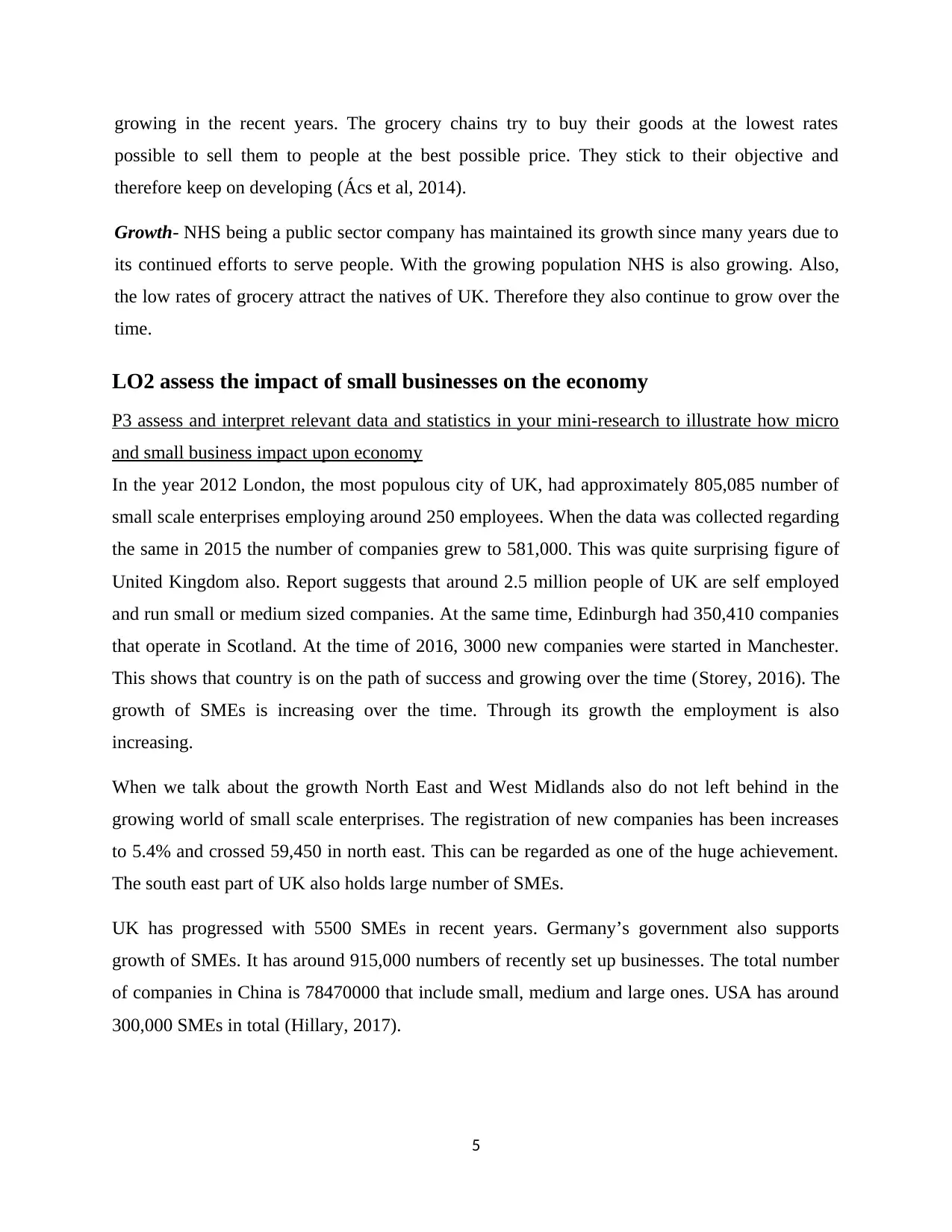
growing in the recent years. The grocery chains try to buy their goods at the lowest rates
possible to sell them to people at the best possible price. They stick to their objective and
therefore keep on developing (Ács et al, 2014).
Growth- NHS being a public sector company has maintained its growth since many years due to
its continued efforts to serve people. With the growing population NHS is also growing. Also,
the low rates of grocery attract the natives of UK. Therefore they also continue to grow over the
time.
LO2 assess the impact of small businesses on the economy
P3 assess and interpret relevant data and statistics in your mini-research to illustrate how micro
and small business impact upon economy
In the year 2012 London, the most populous city of UK, had approximately 805,085 number of
small scale enterprises employing around 250 employees. When the data was collected regarding
the same in 2015 the number of companies grew to 581,000. This was quite surprising figure of
United Kingdom also. Report suggests that around 2.5 million people of UK are self employed
and run small or medium sized companies. At the same time, Edinburgh had 350,410 companies
that operate in Scotland. At the time of 2016, 3000 new companies were started in Manchester.
This shows that country is on the path of success and growing over the time (Storey, 2016). The
growth of SMEs is increasing over the time. Through its growth the employment is also
increasing.
When we talk about the growth North East and West Midlands also do not left behind in the
growing world of small scale enterprises. The registration of new companies has been increases
to 5.4% and crossed 59,450 in north east. This can be regarded as one of the huge achievement.
The south east part of UK also holds large number of SMEs.
UK has progressed with 5500 SMEs in recent years. Germany’s government also supports
growth of SMEs. It has around 915,000 numbers of recently set up businesses. The total number
of companies in China is 78470000 that include small, medium and large ones. USA has around
300,000 SMEs in total (Hillary, 2017).
5
possible to sell them to people at the best possible price. They stick to their objective and
therefore keep on developing (Ács et al, 2014).
Growth- NHS being a public sector company has maintained its growth since many years due to
its continued efforts to serve people. With the growing population NHS is also growing. Also,
the low rates of grocery attract the natives of UK. Therefore they also continue to grow over the
time.
LO2 assess the impact of small businesses on the economy
P3 assess and interpret relevant data and statistics in your mini-research to illustrate how micro
and small business impact upon economy
In the year 2012 London, the most populous city of UK, had approximately 805,085 number of
small scale enterprises employing around 250 employees. When the data was collected regarding
the same in 2015 the number of companies grew to 581,000. This was quite surprising figure of
United Kingdom also. Report suggests that around 2.5 million people of UK are self employed
and run small or medium sized companies. At the same time, Edinburgh had 350,410 companies
that operate in Scotland. At the time of 2016, 3000 new companies were started in Manchester.
This shows that country is on the path of success and growing over the time (Storey, 2016). The
growth of SMEs is increasing over the time. Through its growth the employment is also
increasing.
When we talk about the growth North East and West Midlands also do not left behind in the
growing world of small scale enterprises. The registration of new companies has been increases
to 5.4% and crossed 59,450 in north east. This can be regarded as one of the huge achievement.
The south east part of UK also holds large number of SMEs.
UK has progressed with 5500 SMEs in recent years. Germany’s government also supports
growth of SMEs. It has around 915,000 numbers of recently set up businesses. The total number
of companies in China is 78470000 that include small, medium and large ones. USA has around
300,000 SMEs in total (Hillary, 2017).
5
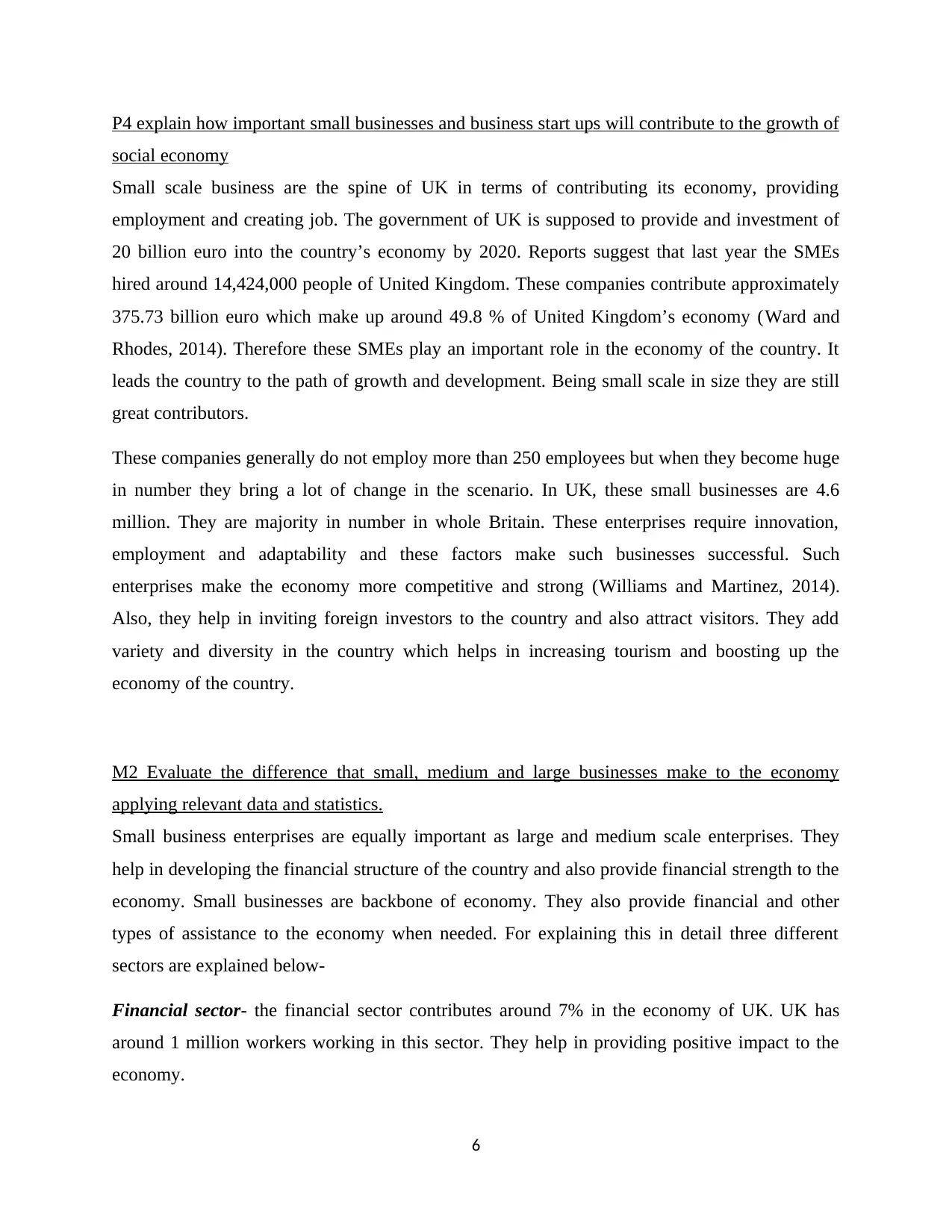
P4 explain how important small businesses and business start ups will contribute to the growth of
social economy
Small scale business are the spine of UK in terms of contributing its economy, providing
employment and creating job. The government of UK is supposed to provide and investment of
20 billion euro into the country’s economy by 2020. Reports suggest that last year the SMEs
hired around 14,424,000 people of United Kingdom. These companies contribute approximately
375.73 billion euro which make up around 49.8 % of United Kingdom’s economy (Ward and
Rhodes, 2014). Therefore these SMEs play an important role in the economy of the country. It
leads the country to the path of growth and development. Being small scale in size they are still
great contributors.
These companies generally do not employ more than 250 employees but when they become huge
in number they bring a lot of change in the scenario. In UK, these small businesses are 4.6
million. They are majority in number in whole Britain. These enterprises require innovation,
employment and adaptability and these factors make such businesses successful. Such
enterprises make the economy more competitive and strong (Williams and Martinez, 2014).
Also, they help in inviting foreign investors to the country and also attract visitors. They add
variety and diversity in the country which helps in increasing tourism and boosting up the
economy of the country.
M2 Evaluate the difference that small, medium and large businesses make to the economy
applying relevant data and statistics.
Small business enterprises are equally important as large and medium scale enterprises. They
help in developing the financial structure of the country and also provide financial strength to the
economy. Small businesses are backbone of economy. They also provide financial and other
types of assistance to the economy when needed. For explaining this in detail three different
sectors are explained below-
Financial sector- the financial sector contributes around 7% in the economy of UK. UK has
around 1 million workers working in this sector. They help in providing positive impact to the
economy.
6
social economy
Small scale business are the spine of UK in terms of contributing its economy, providing
employment and creating job. The government of UK is supposed to provide and investment of
20 billion euro into the country’s economy by 2020. Reports suggest that last year the SMEs
hired around 14,424,000 people of United Kingdom. These companies contribute approximately
375.73 billion euro which make up around 49.8 % of United Kingdom’s economy (Ward and
Rhodes, 2014). Therefore these SMEs play an important role in the economy of the country. It
leads the country to the path of growth and development. Being small scale in size they are still
great contributors.
These companies generally do not employ more than 250 employees but when they become huge
in number they bring a lot of change in the scenario. In UK, these small businesses are 4.6
million. They are majority in number in whole Britain. These enterprises require innovation,
employment and adaptability and these factors make such businesses successful. Such
enterprises make the economy more competitive and strong (Williams and Martinez, 2014).
Also, they help in inviting foreign investors to the country and also attract visitors. They add
variety and diversity in the country which helps in increasing tourism and boosting up the
economy of the country.
M2 Evaluate the difference that small, medium and large businesses make to the economy
applying relevant data and statistics.
Small business enterprises are equally important as large and medium scale enterprises. They
help in developing the financial structure of the country and also provide financial strength to the
economy. Small businesses are backbone of economy. They also provide financial and other
types of assistance to the economy when needed. For explaining this in detail three different
sectors are explained below-
Financial sector- the financial sector contributes around 7% in the economy of UK. UK has
around 1 million workers working in this sector. They help in providing positive impact to the
economy.
6
Secure Best Marks with AI Grader
Need help grading? Try our AI Grader for instant feedback on your assignments.

Manufacturing sector- manufacturing is one of the strongest departments of any country. this
sector is growing at a faster rate in UK’s economy. They contribute around 10% in UK’s
economy which is quite beneficial for them (Bridge and O'Neill, 2012).
Education sector- the education sector of UK generates approx. 11 billion in an year through
exports. They account for 14% of income through well known universities. They have high
impact on economy of UK.
LO3 Determine and assess the key aspects of an entrepreneurial mind-set.
P5 determine the characteristics, traits and skills of successful entrepreneurs, which differentiate
them from other business managers
An entrepreneur has various traits skills and characteristics. These are described as under-
Traits
They become an inspiration: the ability and struggle of the entrepreneurs to bring something
new to the market make them different from others. They become an inspiration for others. They
inspire other people to be like them and innovate something new. Sometimes the ability to
inspire others is in built in them.
They are wise- the entrepreneurs are famous for their wisdom. They are quite wise in nature and
judge everything with prudence. Their prudence helps them to understand whether a business can
be profit making or unsuccessful. They can judge the possible situations of future. They have the
ability to predict (Galor and Michalopoulos, 2012).
7
sector is growing at a faster rate in UK’s economy. They contribute around 10% in UK’s
economy which is quite beneficial for them (Bridge and O'Neill, 2012).
Education sector- the education sector of UK generates approx. 11 billion in an year through
exports. They account for 14% of income through well known universities. They have high
impact on economy of UK.
LO3 Determine and assess the key aspects of an entrepreneurial mind-set.
P5 determine the characteristics, traits and skills of successful entrepreneurs, which differentiate
them from other business managers
An entrepreneur has various traits skills and characteristics. These are described as under-
Traits
They become an inspiration: the ability and struggle of the entrepreneurs to bring something
new to the market make them different from others. They become an inspiration for others. They
inspire other people to be like them and innovate something new. Sometimes the ability to
inspire others is in built in them.
They are wise- the entrepreneurs are famous for their wisdom. They are quite wise in nature and
judge everything with prudence. Their prudence helps them to understand whether a business can
be profit making or unsuccessful. They can judge the possible situations of future. They have the
ability to predict (Galor and Michalopoulos, 2012).
7
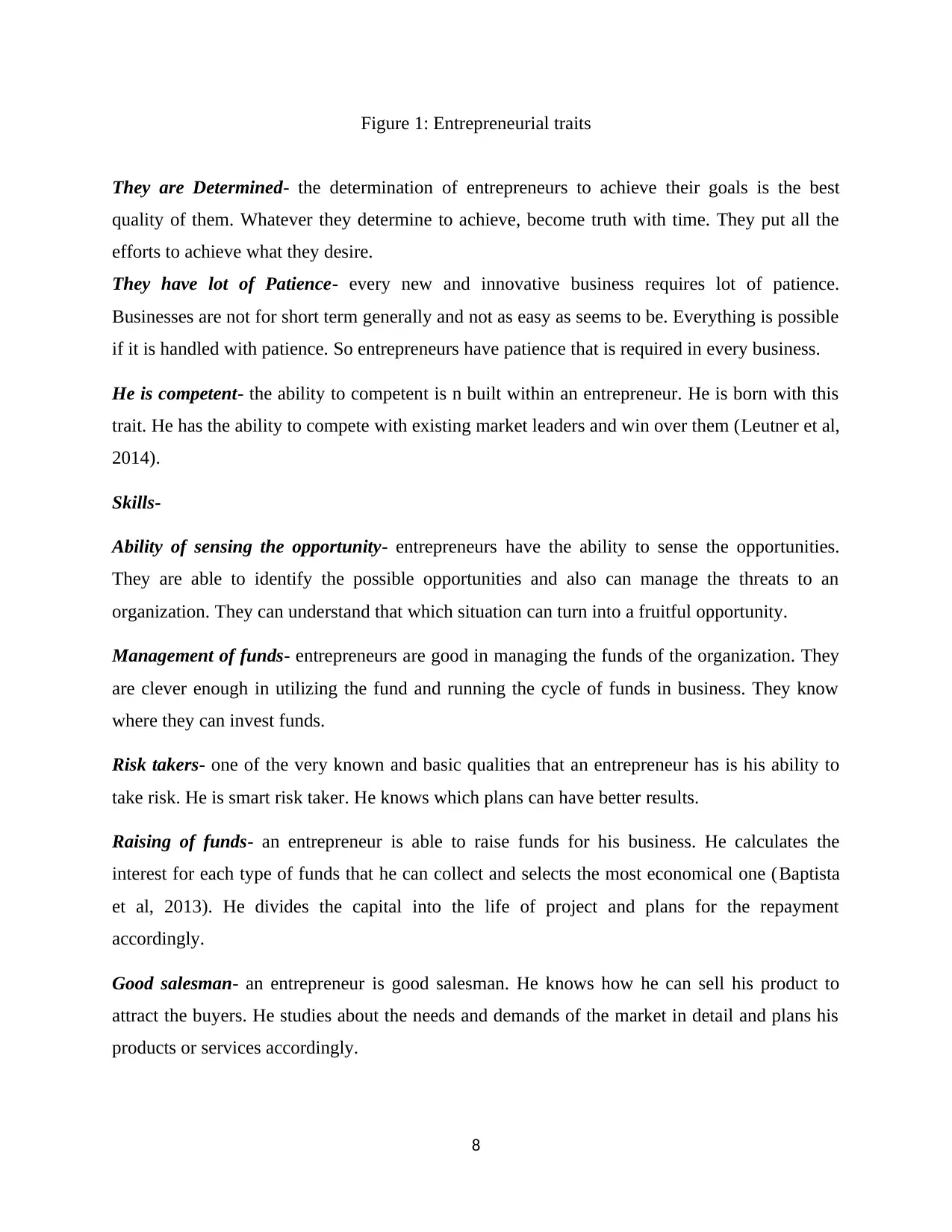
Figure 1: Entrepreneurial traits
They are Determined- the determination of entrepreneurs to achieve their goals is the best
quality of them. Whatever they determine to achieve, become truth with time. They put all the
efforts to achieve what they desire.
They have lot of Patience- every new and innovative business requires lot of patience.
Businesses are not for short term generally and not as easy as seems to be. Everything is possible
if it is handled with patience. So entrepreneurs have patience that is required in every business.
He is competent- the ability to competent is n built within an entrepreneur. He is born with this
trait. He has the ability to compete with existing market leaders and win over them (Leutner et al,
2014).
Skills-
Ability of sensing the opportunity- entrepreneurs have the ability to sense the opportunities.
They are able to identify the possible opportunities and also can manage the threats to an
organization. They can understand that which situation can turn into a fruitful opportunity.
Management of funds- entrepreneurs are good in managing the funds of the organization. They
are clever enough in utilizing the fund and running the cycle of funds in business. They know
where they can invest funds.
Risk takers- one of the very known and basic qualities that an entrepreneur has is his ability to
take risk. He is smart risk taker. He knows which plans can have better results.
Raising of funds- an entrepreneur is able to raise funds for his business. He calculates the
interest for each type of funds that he can collect and selects the most economical one (Baptista
et al, 2013). He divides the capital into the life of project and plans for the repayment
accordingly.
Good salesman- an entrepreneur is good salesman. He knows how he can sell his product to
attract the buyers. He studies about the needs and demands of the market in detail and plans his
products or services accordingly.
8
They are Determined- the determination of entrepreneurs to achieve their goals is the best
quality of them. Whatever they determine to achieve, become truth with time. They put all the
efforts to achieve what they desire.
They have lot of Patience- every new and innovative business requires lot of patience.
Businesses are not for short term generally and not as easy as seems to be. Everything is possible
if it is handled with patience. So entrepreneurs have patience that is required in every business.
He is competent- the ability to competent is n built within an entrepreneur. He is born with this
trait. He has the ability to compete with existing market leaders and win over them (Leutner et al,
2014).
Skills-
Ability of sensing the opportunity- entrepreneurs have the ability to sense the opportunities.
They are able to identify the possible opportunities and also can manage the threats to an
organization. They can understand that which situation can turn into a fruitful opportunity.
Management of funds- entrepreneurs are good in managing the funds of the organization. They
are clever enough in utilizing the fund and running the cycle of funds in business. They know
where they can invest funds.
Risk takers- one of the very known and basic qualities that an entrepreneur has is his ability to
take risk. He is smart risk taker. He knows which plans can have better results.
Raising of funds- an entrepreneur is able to raise funds for his business. He calculates the
interest for each type of funds that he can collect and selects the most economical one (Baptista
et al, 2013). He divides the capital into the life of project and plans for the repayment
accordingly.
Good salesman- an entrepreneur is good salesman. He knows how he can sell his product to
attract the buyers. He studies about the needs and demands of the market in detail and plans his
products or services accordingly.
8
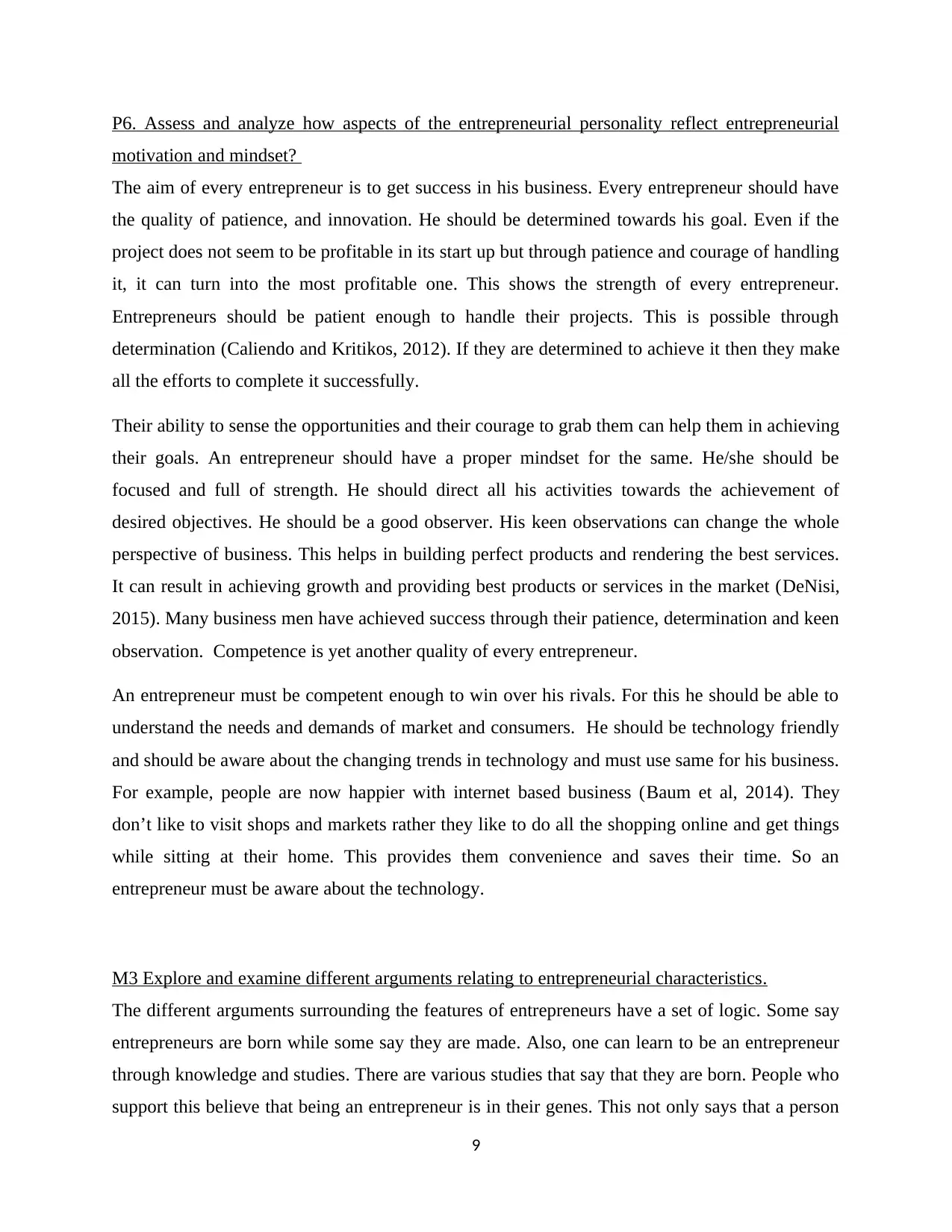
P6. Assess and analyze how aspects of the entrepreneurial personality reflect entrepreneurial
motivation and mindset?
The aim of every entrepreneur is to get success in his business. Every entrepreneur should have
the quality of patience, and innovation. He should be determined towards his goal. Even if the
project does not seem to be profitable in its start up but through patience and courage of handling
it, it can turn into the most profitable one. This shows the strength of every entrepreneur.
Entrepreneurs should be patient enough to handle their projects. This is possible through
determination (Caliendo and Kritikos, 2012). If they are determined to achieve it then they make
all the efforts to complete it successfully.
Their ability to sense the opportunities and their courage to grab them can help them in achieving
their goals. An entrepreneur should have a proper mindset for the same. He/she should be
focused and full of strength. He should direct all his activities towards the achievement of
desired objectives. He should be a good observer. His keen observations can change the whole
perspective of business. This helps in building perfect products and rendering the best services.
It can result in achieving growth and providing best products or services in the market (DeNisi,
2015). Many business men have achieved success through their patience, determination and keen
observation. Competence is yet another quality of every entrepreneur.
An entrepreneur must be competent enough to win over his rivals. For this he should be able to
understand the needs and demands of market and consumers. He should be technology friendly
and should be aware about the changing trends in technology and must use same for his business.
For example, people are now happier with internet based business (Baum et al, 2014). They
don’t like to visit shops and markets rather they like to do all the shopping online and get things
while sitting at their home. This provides them convenience and saves their time. So an
entrepreneur must be aware about the technology.
M3 Explore and examine different arguments relating to entrepreneurial characteristics.
The different arguments surrounding the features of entrepreneurs have a set of logic. Some say
entrepreneurs are born while some say they are made. Also, one can learn to be an entrepreneur
through knowledge and studies. There are various studies that say that they are born. People who
support this believe that being an entrepreneur is in their genes. This not only says that a person
9
motivation and mindset?
The aim of every entrepreneur is to get success in his business. Every entrepreneur should have
the quality of patience, and innovation. He should be determined towards his goal. Even if the
project does not seem to be profitable in its start up but through patience and courage of handling
it, it can turn into the most profitable one. This shows the strength of every entrepreneur.
Entrepreneurs should be patient enough to handle their projects. This is possible through
determination (Caliendo and Kritikos, 2012). If they are determined to achieve it then they make
all the efforts to complete it successfully.
Their ability to sense the opportunities and their courage to grab them can help them in achieving
their goals. An entrepreneur should have a proper mindset for the same. He/she should be
focused and full of strength. He should direct all his activities towards the achievement of
desired objectives. He should be a good observer. His keen observations can change the whole
perspective of business. This helps in building perfect products and rendering the best services.
It can result in achieving growth and providing best products or services in the market (DeNisi,
2015). Many business men have achieved success through their patience, determination and keen
observation. Competence is yet another quality of every entrepreneur.
An entrepreneur must be competent enough to win over his rivals. For this he should be able to
understand the needs and demands of market and consumers. He should be technology friendly
and should be aware about the changing trends in technology and must use same for his business.
For example, people are now happier with internet based business (Baum et al, 2014). They
don’t like to visit shops and markets rather they like to do all the shopping online and get things
while sitting at their home. This provides them convenience and saves their time. So an
entrepreneur must be aware about the technology.
M3 Explore and examine different arguments relating to entrepreneurial characteristics.
The different arguments surrounding the features of entrepreneurs have a set of logic. Some say
entrepreneurs are born while some say they are made. Also, one can learn to be an entrepreneur
through knowledge and studies. There are various studies that say that they are born. People who
support this believe that being an entrepreneur is in their genes. This not only says that a person
9
Paraphrase This Document
Need a fresh take? Get an instant paraphrase of this document with our AI Paraphraser
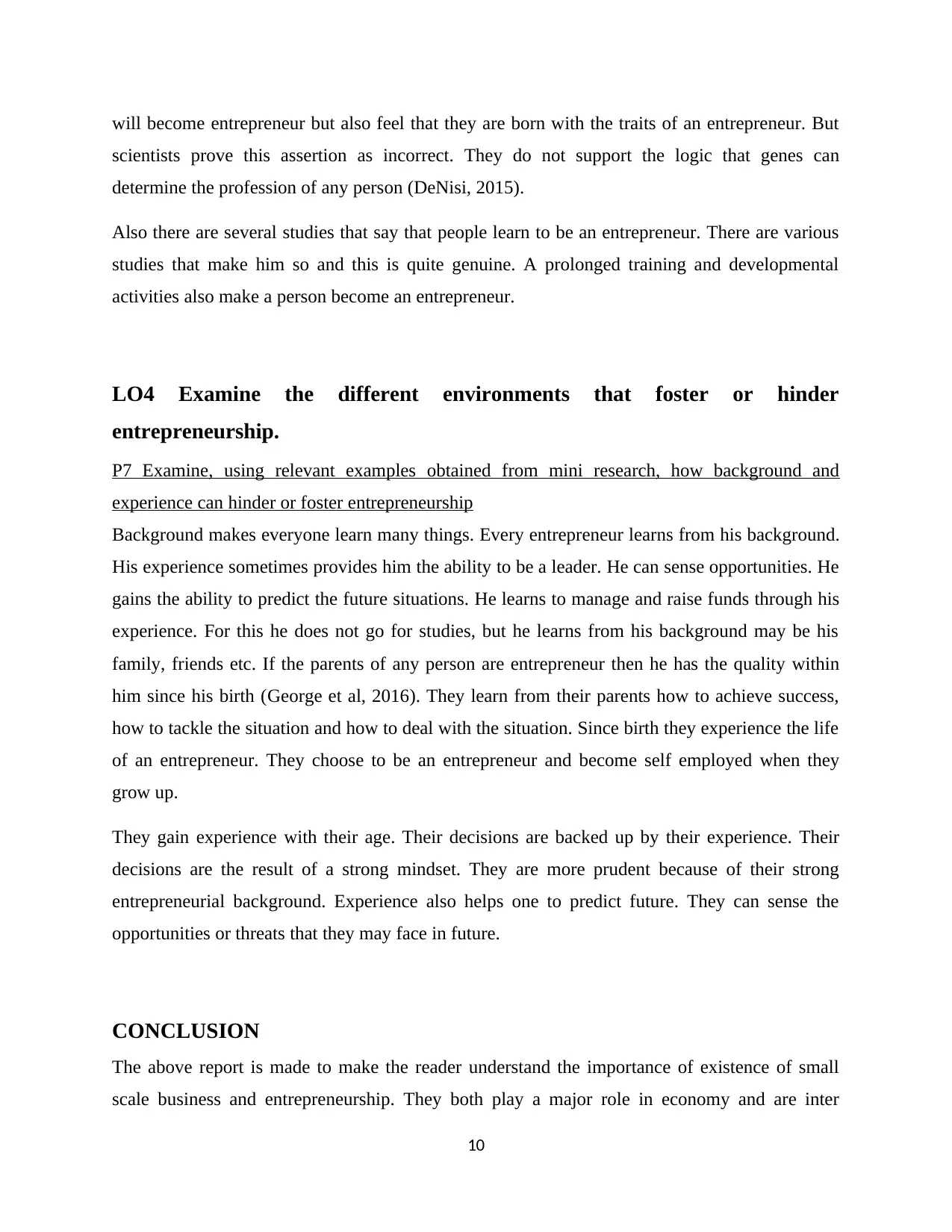
will become entrepreneur but also feel that they are born with the traits of an entrepreneur. But
scientists prove this assertion as incorrect. They do not support the logic that genes can
determine the profession of any person (DeNisi, 2015).
Also there are several studies that say that people learn to be an entrepreneur. There are various
studies that make him so and this is quite genuine. A prolonged training and developmental
activities also make a person become an entrepreneur.
LO4 Examine the different environments that foster or hinder
entrepreneurship.
P7 Examine, using relevant examples obtained from mini research, how background and
experience can hinder or foster entrepreneurship
Background makes everyone learn many things. Every entrepreneur learns from his background.
His experience sometimes provides him the ability to be a leader. He can sense opportunities. He
gains the ability to predict the future situations. He learns to manage and raise funds through his
experience. For this he does not go for studies, but he learns from his background may be his
family, friends etc. If the parents of any person are entrepreneur then he has the quality within
him since his birth (George et al, 2016). They learn from their parents how to achieve success,
how to tackle the situation and how to deal with the situation. Since birth they experience the life
of an entrepreneur. They choose to be an entrepreneur and become self employed when they
grow up.
They gain experience with their age. Their decisions are backed up by their experience. Their
decisions are the result of a strong mindset. They are more prudent because of their strong
entrepreneurial background. Experience also helps one to predict future. They can sense the
opportunities or threats that they may face in future.
CONCLUSION
The above report is made to make the reader understand the importance of existence of small
scale business and entrepreneurship. They both play a major role in economy and are inter
10
scientists prove this assertion as incorrect. They do not support the logic that genes can
determine the profession of any person (DeNisi, 2015).
Also there are several studies that say that people learn to be an entrepreneur. There are various
studies that make him so and this is quite genuine. A prolonged training and developmental
activities also make a person become an entrepreneur.
LO4 Examine the different environments that foster or hinder
entrepreneurship.
P7 Examine, using relevant examples obtained from mini research, how background and
experience can hinder or foster entrepreneurship
Background makes everyone learn many things. Every entrepreneur learns from his background.
His experience sometimes provides him the ability to be a leader. He can sense opportunities. He
gains the ability to predict the future situations. He learns to manage and raise funds through his
experience. For this he does not go for studies, but he learns from his background may be his
family, friends etc. If the parents of any person are entrepreneur then he has the quality within
him since his birth (George et al, 2016). They learn from their parents how to achieve success,
how to tackle the situation and how to deal with the situation. Since birth they experience the life
of an entrepreneur. They choose to be an entrepreneur and become self employed when they
grow up.
They gain experience with their age. Their decisions are backed up by their experience. Their
decisions are the result of a strong mindset. They are more prudent because of their strong
entrepreneurial background. Experience also helps one to predict future. They can sense the
opportunities or threats that they may face in future.
CONCLUSION
The above report is made to make the reader understand the importance of existence of small
scale business and entrepreneurship. They both play a major role in economy and are inter
10

connected in some or the other way. They have high impact on economy of the country and are
backbone of the economy. Growth of SMEs in the country is beneficial and good for the country.
11
backbone of the economy. Growth of SMEs in the country is beneficial and good for the country.
11
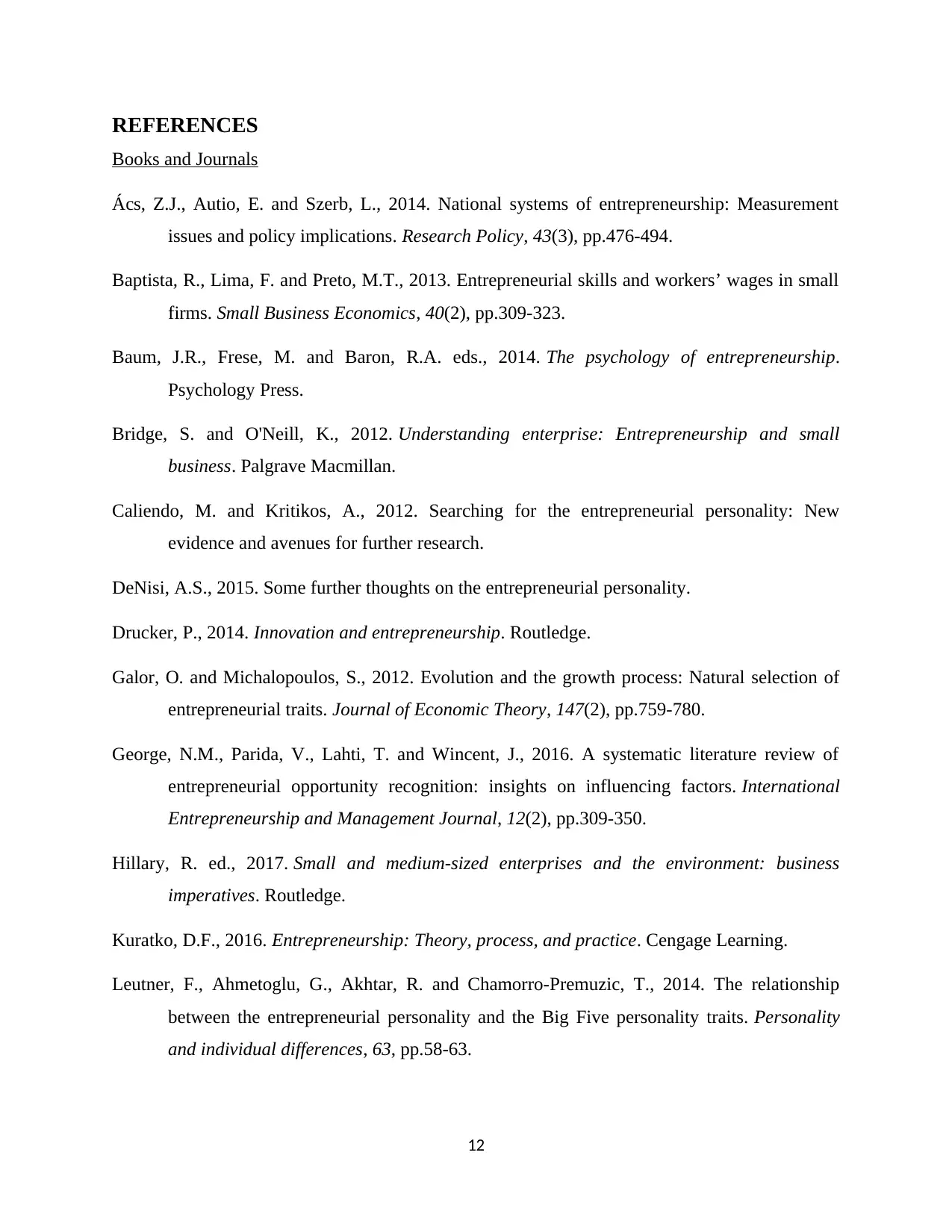
REFERENCES
Books and Journals
Ács, Z.J., Autio, E. and Szerb, L., 2014. National systems of entrepreneurship: Measurement
issues and policy implications. Research Policy, 43(3), pp.476-494.
Baptista, R., Lima, F. and Preto, M.T., 2013. Entrepreneurial skills and workers’ wages in small
firms. Small Business Economics, 40(2), pp.309-323.
Baum, J.R., Frese, M. and Baron, R.A. eds., 2014. The psychology of entrepreneurship.
Psychology Press.
Bridge, S. and O'Neill, K., 2012. Understanding enterprise: Entrepreneurship and small
business. Palgrave Macmillan.
Caliendo, M. and Kritikos, A., 2012. Searching for the entrepreneurial personality: New
evidence and avenues for further research.
DeNisi, A.S., 2015. Some further thoughts on the entrepreneurial personality.
Drucker, P., 2014. Innovation and entrepreneurship. Routledge.
Galor, O. and Michalopoulos, S., 2012. Evolution and the growth process: Natural selection of
entrepreneurial traits. Journal of Economic Theory, 147(2), pp.759-780.
George, N.M., Parida, V., Lahti, T. and Wincent, J., 2016. A systematic literature review of
entrepreneurial opportunity recognition: insights on influencing factors. International
Entrepreneurship and Management Journal, 12(2), pp.309-350.
Hillary, R. ed., 2017. Small and medium-sized enterprises and the environment: business
imperatives. Routledge.
Kuratko, D.F., 2016. Entrepreneurship: Theory, process, and practice. Cengage Learning.
Leutner, F., Ahmetoglu, G., Akhtar, R. and Chamorro-Premuzic, T., 2014. The relationship
between the entrepreneurial personality and the Big Five personality traits. Personality
and individual differences, 63, pp.58-63.
12
Books and Journals
Ács, Z.J., Autio, E. and Szerb, L., 2014. National systems of entrepreneurship: Measurement
issues and policy implications. Research Policy, 43(3), pp.476-494.
Baptista, R., Lima, F. and Preto, M.T., 2013. Entrepreneurial skills and workers’ wages in small
firms. Small Business Economics, 40(2), pp.309-323.
Baum, J.R., Frese, M. and Baron, R.A. eds., 2014. The psychology of entrepreneurship.
Psychology Press.
Bridge, S. and O'Neill, K., 2012. Understanding enterprise: Entrepreneurship and small
business. Palgrave Macmillan.
Caliendo, M. and Kritikos, A., 2012. Searching for the entrepreneurial personality: New
evidence and avenues for further research.
DeNisi, A.S., 2015. Some further thoughts on the entrepreneurial personality.
Drucker, P., 2014. Innovation and entrepreneurship. Routledge.
Galor, O. and Michalopoulos, S., 2012. Evolution and the growth process: Natural selection of
entrepreneurial traits. Journal of Economic Theory, 147(2), pp.759-780.
George, N.M., Parida, V., Lahti, T. and Wincent, J., 2016. A systematic literature review of
entrepreneurial opportunity recognition: insights on influencing factors. International
Entrepreneurship and Management Journal, 12(2), pp.309-350.
Hillary, R. ed., 2017. Small and medium-sized enterprises and the environment: business
imperatives. Routledge.
Kuratko, D.F., 2016. Entrepreneurship: Theory, process, and practice. Cengage Learning.
Leutner, F., Ahmetoglu, G., Akhtar, R. and Chamorro-Premuzic, T., 2014. The relationship
between the entrepreneurial personality and the Big Five personality traits. Personality
and individual differences, 63, pp.58-63.
12
Secure Best Marks with AI Grader
Need help grading? Try our AI Grader for instant feedback on your assignments.
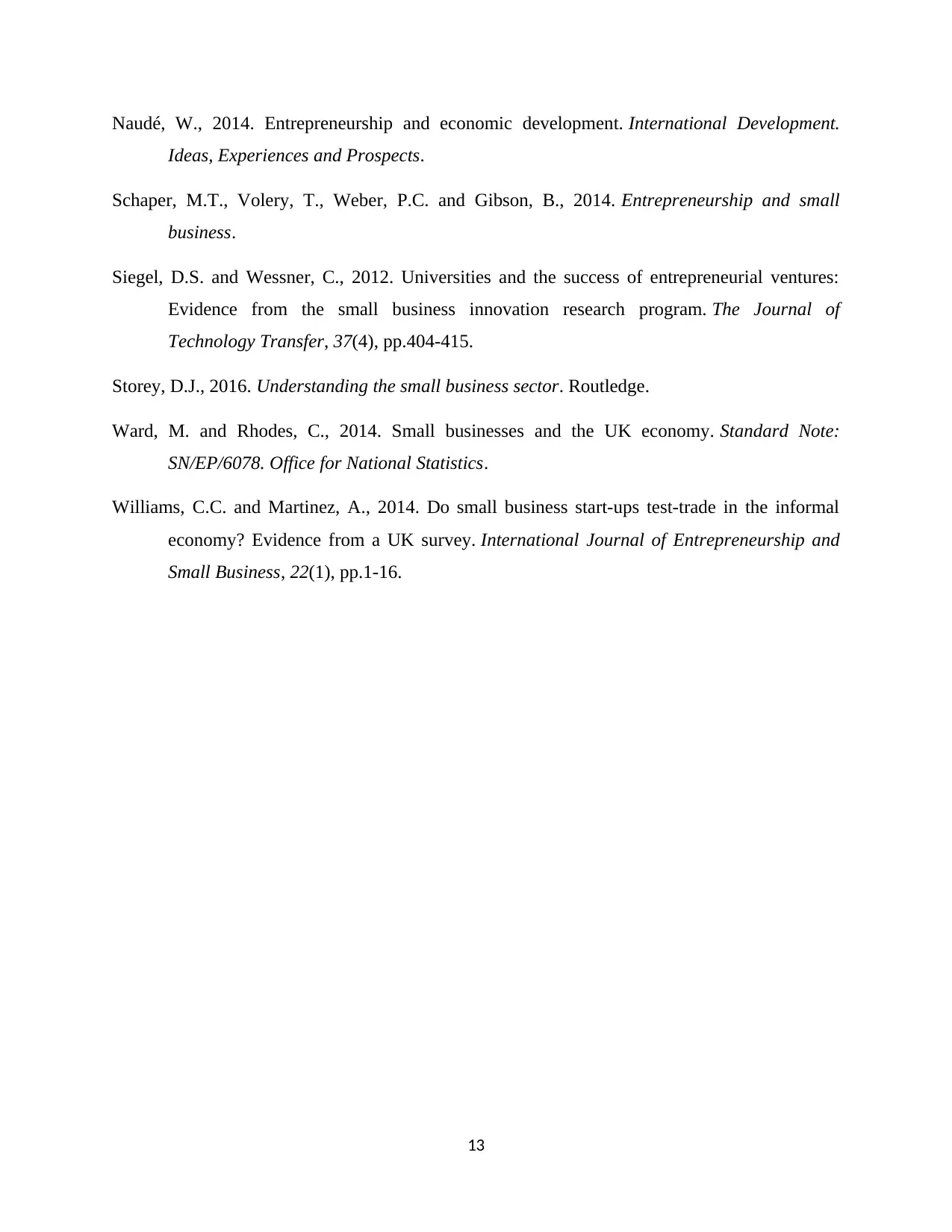
Naudé, W., 2014. Entrepreneurship and economic development. International Development.
Ideas, Experiences and Prospects.
Schaper, M.T., Volery, T., Weber, P.C. and Gibson, B., 2014. Entrepreneurship and small
business.
Siegel, D.S. and Wessner, C., 2012. Universities and the success of entrepreneurial ventures:
Evidence from the small business innovation research program. The Journal of
Technology Transfer, 37(4), pp.404-415.
Storey, D.J., 2016. Understanding the small business sector. Routledge.
Ward, M. and Rhodes, C., 2014. Small businesses and the UK economy. Standard Note:
SN/EP/6078. Office for National Statistics.
Williams, C.C. and Martinez, A., 2014. Do small business start-ups test-trade in the informal
economy? Evidence from a UK survey. International Journal of Entrepreneurship and
Small Business, 22(1), pp.1-16.
13
Ideas, Experiences and Prospects.
Schaper, M.T., Volery, T., Weber, P.C. and Gibson, B., 2014. Entrepreneurship and small
business.
Siegel, D.S. and Wessner, C., 2012. Universities and the success of entrepreneurial ventures:
Evidence from the small business innovation research program. The Journal of
Technology Transfer, 37(4), pp.404-415.
Storey, D.J., 2016. Understanding the small business sector. Routledge.
Ward, M. and Rhodes, C., 2014. Small businesses and the UK economy. Standard Note:
SN/EP/6078. Office for National Statistics.
Williams, C.C. and Martinez, A., 2014. Do small business start-ups test-trade in the informal
economy? Evidence from a UK survey. International Journal of Entrepreneurship and
Small Business, 22(1), pp.1-16.
13
1 out of 17
Related Documents
Your All-in-One AI-Powered Toolkit for Academic Success.
+13062052269
info@desklib.com
Available 24*7 on WhatsApp / Email
![[object Object]](/_next/static/media/star-bottom.7253800d.svg)
Unlock your academic potential
© 2024 | Zucol Services PVT LTD | All rights reserved.





